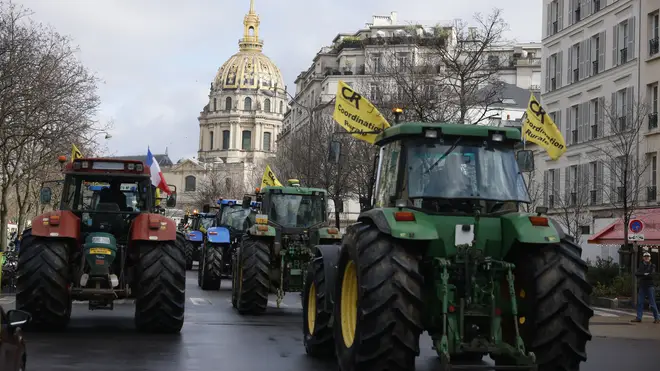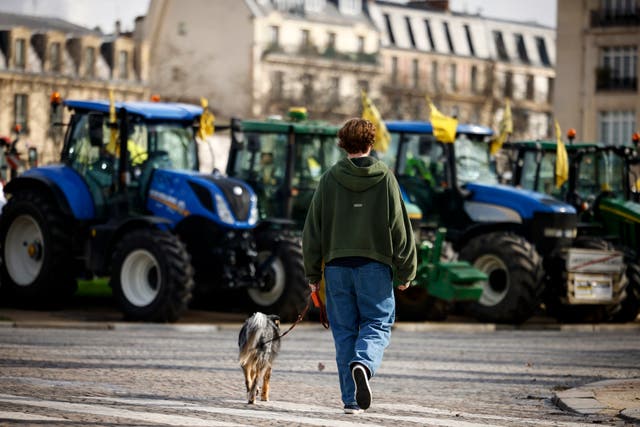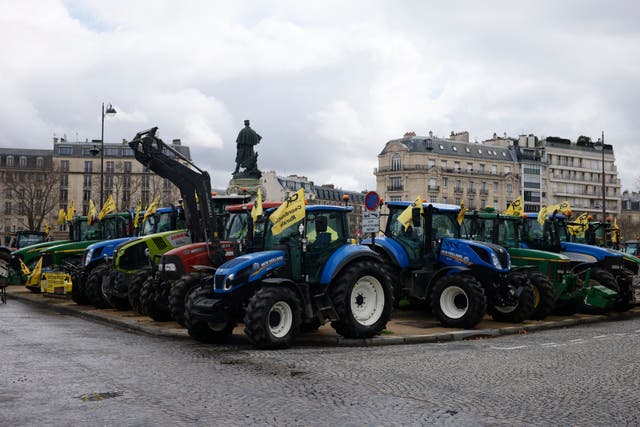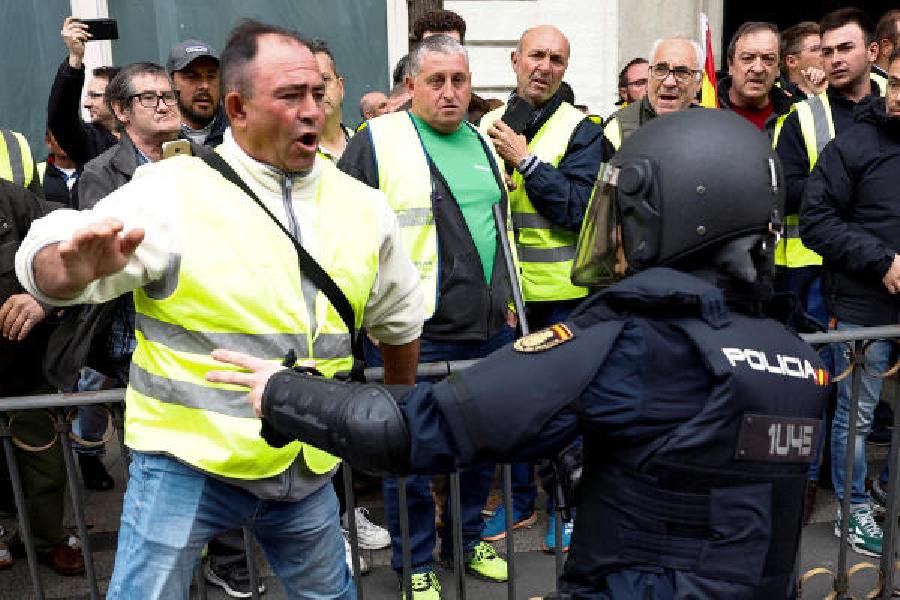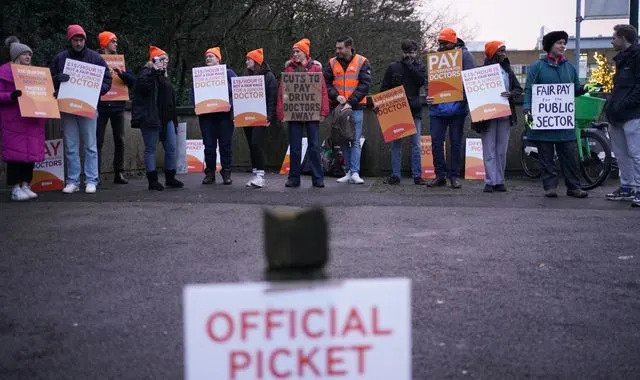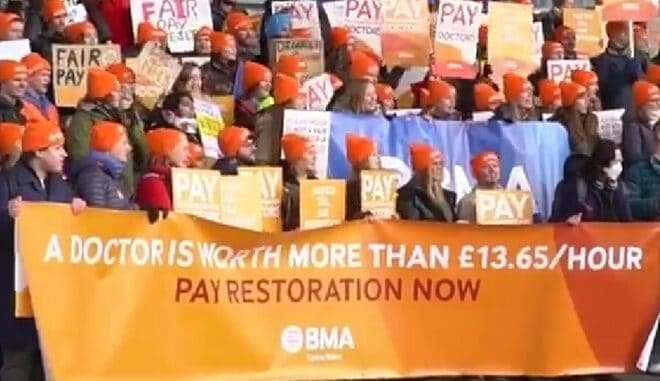BKU (Ugrahan) members burnt effigies at 47 locations in 17 districts of Punjab, including Maur, Bathinda, Sunam, Sangrur, Moga and many other locations.
Written by Raakhi Jagga
Ludhiana | February 24, 2024
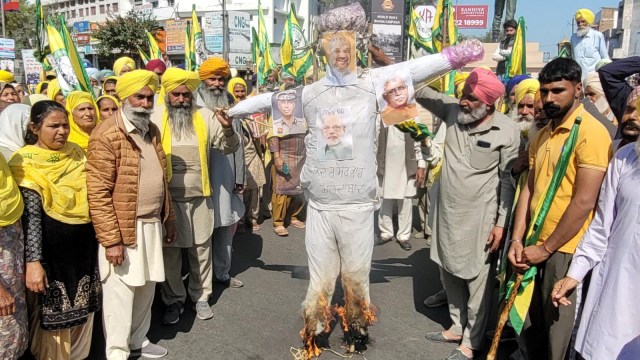
Members of the BKU Ugrahan burns the effigy of PM Modi, Amit Shah, Haryana CM Khattar and DGP of Haryana in Bathinda. (Express Photo)
Hundreds of angry and grief-stricken people — women, men and even children — with black ribbons on their turbans and arms hit the streets in Punjab on Friday observing ‘Aakrosh Diwas’ to protest the death of young farmer Shubhkarman Singh on February 21 at the Khanauri borders during the ongoing Dilli Chalo agitation.
Besides, residents displayed black flags atop their houses and on vehicles as a mark of protest.
The protest call was given by the Samyukta Kisan Morcha (SKM), which is not part of the Dilli Chalo, while SKM (Non-political) and Kisan Mazdoor Morcha (KMM), both part of the agitation, observed ‘Black Day’.
Also Read | Shubkaran Singh, the young Punjab farmer who died during protest: what his room tells about him
“Revolution is in our blood. Demanding our legitimate rights is our right. If the government suppresses us by using force, we need to raise our voices. We are not part of the dharna at Shambhu and Khanauri, but that doesn’t mean we will not raise our voices against the atrocities of Haryana. Farmers at Shambhu said the social media handles of more than 170 people had been blocked by the Centre. This is the death of democracy,” said Manjit Kaur from Khiddikalan village, Barnala, who burnt effigies along with other women Friday afternoon.
Jatinder Kaur Chahal, another protester, said, “They (the government) need to test our DNA…our history…how resilient, we are as a community. If you resist, we will persist.”
Chahal and her husband Harcharan, a state committee member of the Association of Federation of Democratic Rights (AFDR), participated in the protest.
Writer and social activist Sushil Dosanjh, too, erected a black flag atop his house in Taran Taran Friday morning, while many teenagers participated in the protest in Jagraon, Fazilka and Sangrur.
Waheguru Singh of Barnala could be seen holding a black flag all alone outside his house, while Kanwaljit Singh of Jagraon said, “Bahut rosh hai man vich (we have so much anger in our minds)”.”
Saudagar Singh from Ghudani village in Ludhiana said, “Gussa vi hai, dukh vi hai…jwan bacha maar ditta (there is anger as well as grief… they killed our young child).”
Read More | Two deaths at farmer protest sites, one farmer, the other a cop
Women in Kishangarh village of Mansa burnt effigies of several leaders and raised slogans against the Haryana government and the Centre.
BKU (Ugrahan) members burnt effigies at 47 locations in 17 districts of Punjab, including Maur, Bathinda, Sunam, Sangrur, Moga and many other locations.
Central trade unions had also given a call to observe ‘Black Day’ along with the SKM.
In Ludhiana, CTUs and SKM members protested jointly near the mini-secretariat. Led by CPI leaders Dr Arun Mitra and DP Maur, protesters holding black flags and wearing black ribbons burnt effigies.
Meanwhile, the SKM welcomed the Punjab government’s decision to provide compensation of Rs 1 crore and a job to a family member of 21-year-old Shubhkaran Singh, a resident of Balloh village in Bathinda district, who died allegedly in a clash with security personnel at the Punjab-Haryana Khanauri border.
However, Darshan Pal, SKM National Coordination Committee (NCC) member said, “The stand taken by the family of Shubhkaran and farmer organisations needs to be appreciated. The Punjab government needs to act fast as youngsters are getting killed in its territory.”
Pal added, “SKM reiterates its demand of registering an FIR under IPC section 302 (punishment for murder) against the people responsible for state repression and death of the farmers, and a judicial inquiry by a Supreme Court judge into the firing and damages caused to tractors.”

